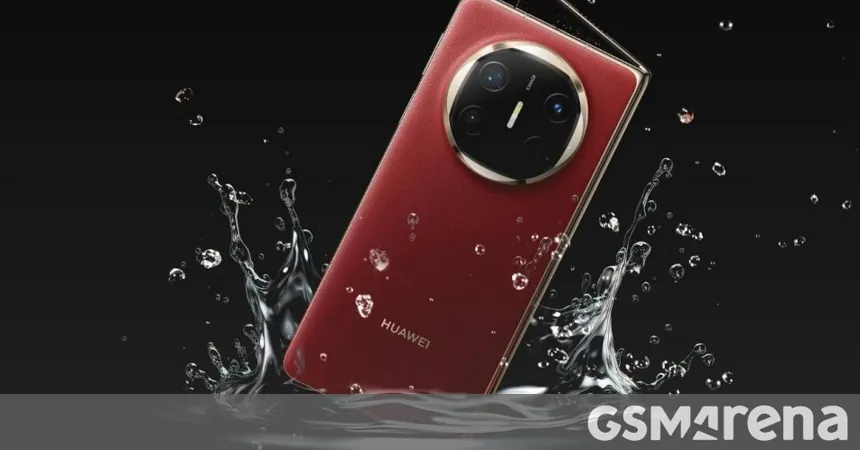
Game-Changer in the Auto Industry: Honda and Nissan Explore Mega Merger!
2024-12-23
Author: Rajesh
Introduction
In a groundbreaking announcement from Tokyo, Honda and Nissan have confirmed their intention to explore a potential merger and establish a joint holding company. This historic move, revealed on December 23, has the potential to create the world's third-largest automaker, signaling a monumental shift in an industry facing unprecedented challenges.
Details of the Proposed Merger
The proposed merger aims for staggering combined sales of 30 trillion yen (approximately US$191 billion) along with an operating profit exceeding 3 trillion yen. Executives from both companies have indicated they hope to finalize discussions by June 2025, with plans to establish the new holding company by August 2026. At that point, it is expected that shares of both companies will be delisted from stock exchanges, leading to a new chapter in their histories.
Impact on the Automotive Market
This strategic consolidation would see Honda, Japan’s second-largest car manufacturer, joining forces with Nissan, significantly boosting their collective market power in a landscape increasingly dominated by startups like Tesla and major Chinese competitors. While Honda boasts a market capitalization of over US$40 billion, Nissan is valued around US$10 billion, showcasing the vast resources that could be leveraged through this partnership.
Potential for Collaboration with Mitsubishi Motors
Notably, should these two automotive giants move forward, they could consider combining operations with Mitsubishi Motors, elevating their global sales to over 8 million vehicles. Currently, Hyundai and Kia hold the number three spot in global rankings, making this merger a critical maneuver to reclaim competitive advantage.
Historical Context
Historically, this merger would be reminiscent of Fiat Chrysler's merger with PSA in 2021, which created Stellantis in a deal worth US$52 billion, showcasing just how significant this potential industry shake-up could be.
Strategic Partnerships
Over the past few months, both Honda and Nissan have been actively seeking ways to enhance their partnership. This includes collaborative efforts in electrification and software development, further amplified by their joint research initiatives with Mitsubishi Motors announced earlier this year.
Challenges Faced by Both Companies
However, the urgency for this merger has grown amidst recent challenges; Nissan declared a staggering 9,000 job cuts and a drastic reduction of 20% in its global production capacity following disappointing sales figures in pivotal markets like China and the United States. Honda, too, has faced downhill spirals in earnings largely due to weak performance in the Chinese market.
Skepticism about the Merger
Yet, not everyone is optimistic about the Honda-Nissan alliance. Former Nissan chairman Carlos Ghosn, currently a fugitive after fleeing Japan, expressed skepticism about the merger's success, suggesting that the two automakers lack complementary strengths. His critical perspective echoes the caution that many industry analysts are taking regarding the feasibility of such a union.
Market Reactions and Future Considerations
Interestingly, Renault, Nissan's largest shareholder, has signaled openness to the merger, indicating it would consider the implications seriously. Meanwhile, Taiwanese tech giant Foxconn recently attempted to engage with Nissan regarding a bid but was rebuffed, showcasing the competitive landscape that both Honda and Nissan are navigating.
Conclusion
The market has responded positively to the potential merger, with Honda shares rising by 3.8%, Nissan gaining 1.6%, and Mitsubishi Motors advanced by 5.3%, outperforming the benchmark Nikkei index which rose by 1.2%. As the automotive industry stands on the brink of transformation, whether this historic merger between Honda and Nissan will pave the way for formidable resilience against emerging rivals remains to be seen. Buckle up, as the race for innovation and market share heats up!





 Brasil (PT)
Brasil (PT)
 Canada (EN)
Canada (EN)
 Chile (ES)
Chile (ES)
 España (ES)
España (ES)
 France (FR)
France (FR)
 Hong Kong (EN)
Hong Kong (EN)
 Italia (IT)
Italia (IT)
 日本 (JA)
日本 (JA)
 Magyarország (HU)
Magyarország (HU)
 Norge (NO)
Norge (NO)
 Polska (PL)
Polska (PL)
 Schweiz (DE)
Schweiz (DE)
 Singapore (EN)
Singapore (EN)
 Sverige (SV)
Sverige (SV)
 Suomi (FI)
Suomi (FI)
 Türkiye (TR)
Türkiye (TR)